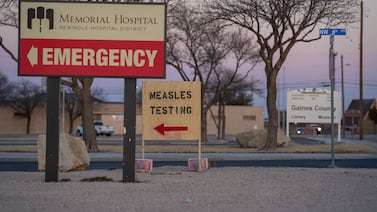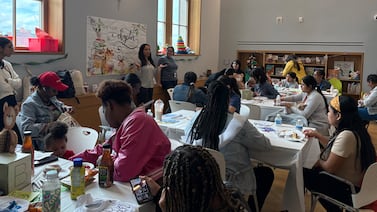This is a guest essay for Healthbeat. Public health, explained: Sign up to receive Healthbeat’s free national newsletter here.
In the first months of the Trump administration’s return, public health datasets, taxpayer-funded research, and agency websites have been deleted or altered in a systematic dismantling of public access to information that guides health policy, provides transparency, and saves lives.
Though every incoming administration makes changes to government websites (curated by the End of Term Archive), these efforts are unprecedented.
Public health professionals rely on federally maintained data to track disease trends, assess risk factors, and design interventions. Yet, beginning in late January, datasets central to this work started to vanish.
The administration distributed lists of banned terms no longer permitted in published content to federal agencies, including phrases like “gender identity,” “health equity,” “LGBTQ+,” and “PrEP,” an HIV drug. Estimates suggest over 3,000 public datasets and 8,000 government web pages have been removed or substantially changed.
For example, the Youth Risk Behavior Surveillance System and the Behavioral Risk Factor Surveillance System – two datasets essential to our understanding of adolescent health, chronic illness, and behavioral trends – briefly vanished from the Centers for Disease Control and Prevention website. They reappeared after court orders and with disclaimers saying the surveys promote “gender ideology.”
More recently, U.S. Health and Human Services Secretary Robert F. Kennedy Jr. removed a CDC briefing on the vaccine preservative thimerosal from the Advisory Committee on Immunization Practices website during its June meeting. The briefing conflicted with the unvetted, outside research presented by a leader of the anti-vaccination organization founded by Kennedy, Children’s Health Defense. Anticipating its removal, the publication Inside Medicine archived the document.
Information vacuum has consequences
These actions help dismantle the infrastructure for evidence-based public health, leaving a void that can be filled with misinformation and political ideology (if it’s filled at all). Researchers lose visibility into public health trends. Journalists lose access to reliable statistics. Communities lose evidence that justifies public services and protections.
The loss of public data will affect Americans in many ways:
- Less reliable information to inform health decisions: When information on vaccines, contraception, or sexual health is altered without evidence-based reason, people can’t make informed decisions about their health.
- Fewer resources for local health programs: Programs supporting school nutrition, maternal health, and HIV prevention depend on data to justify funding. Without it, those resources are harder to maintain.
- Exclusion of vulnerable groups: Erasing terms like “LGBTQ+” or “gender identity” means these groups won’t be counted in research, leading to fewer protections and resources and more discrimination.
- Slower response in health emergencies: Without access to real-time data from agencies like the CDC or Environmental Protection Agency, emergency responses to disease outbreaks, natural disasters, and other health crises are delayed.
- Elimination of decades of research tools: From students to scientists, people rely on public databases for everything from school projects to public policy. Removing access limits who can learn and lead.
Efforts underway to rescue research
In response, librarians, researchers, and public health advocates have launched efforts to rescue and store endangered data and archive federal webpages before they’re lost.
The Data Rescue Project, a nonprofit that started as a shared Google document by volunteer librarians, archivists, and coders, is dedicated to maintaining public access to federal datasets. It has an active catalog of more than 1,000 rescued datasets and a running list of 30 initiatives working on saving public data.
CDC Restored replicates the CDC’s website pre-Jan. 7, while the Reproductive Rights Archive and American College of Obstetrics and Gynecologists preserve content removed from U.S. Department of Justice and CDC pages on reproductive health, immunizations, and contraception. The Wayback Machine has backed up deleted material from the U.S. Agency for International Development and HHS.
On a global level, Germany’s Information Centre for the Life Sciences ZB Med is creating the Open Life Science Publications Database as an alternative to PubMed, the critical biomedical literature database created and maintained by the U.S. National Library of Medicine.
These interventions are acts of protest and public service. In the absence of federal stewardship, individual archivists, journalists, and librarians are the frontline of information preservation.
If knowledge is power, then losing it is disempowerment. Public data belongs to the people, and efforts like the Data Rescue Project, CDC Restored, and grassroots archivists are fighting to reclaim and preserve it.
Rosemary Farrell is an assistant professor, librarian, and MPH student at the CUNY Graduate School of Public Health and Health Policy. Katherine Hartley is an MPH student at the CUNY Graduate School of Public Health and Health Policy and a public health communicator.







